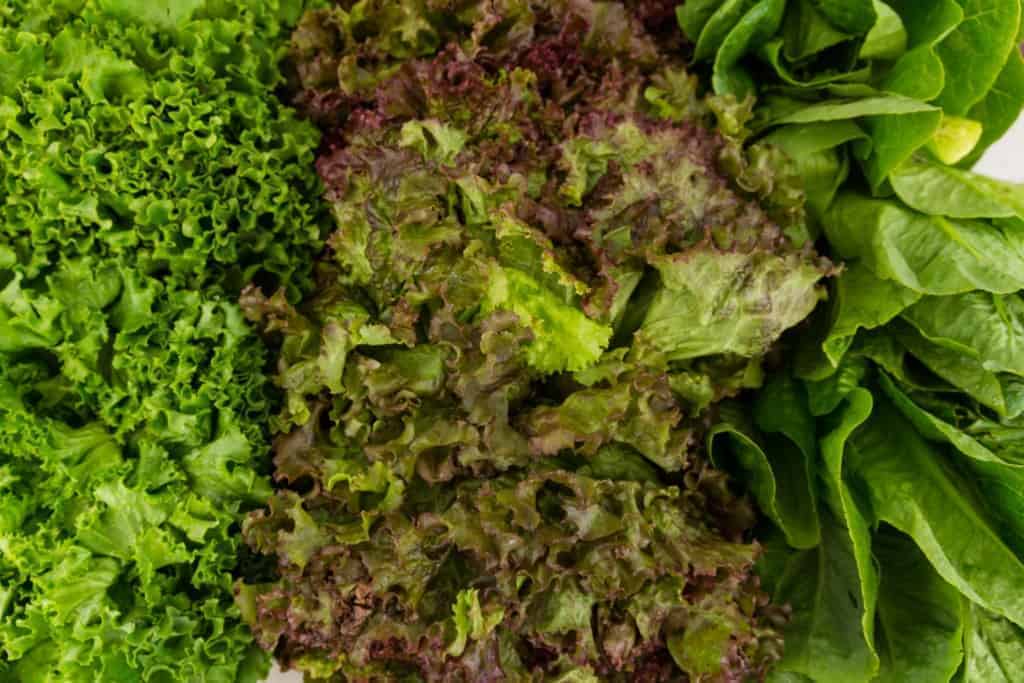Food of the Month – Leafy Greens

Click here for a foolproof salad recipe formula.
Lettuce thrives in June when the soil is warm but the air is not yet hot and prefers cooler climates below 75° F for sweeter flavor and to avoid bolting.
These leafy greens provide a low calorie and hydrating base for salads. Nutritionally, lettuce provides vitamin A, vitamin K, folate and iron. While other leafy greens may be more nutrient dense, lettuce certainly should have a regular home at your dinner table.
Storage Tips: Rinse leaves under cool running water and let drip dry on a towel before wrapping in loose paper towel and store in open zip top bag. If stored too damp, leaves will brown and start to decompose.
To rejuvenate wilted lettuce, slice off a bit at the of base of the leaf and soak entire leaf in ice water for 20 minutes to rehydrate.
Iceberg: Classic cultivar growing in a tightly packed head like green cabbage. Contrary to popular belief, iceberg does contain nutrients and, at only 10 calories per cup, is an easy way to bulk up a low calorie meal. The first lettuce to be shipped long distances, it got its name from the shipping method—piles of lettuce heads covered in chipped ice resembling an iceberg. The crunchy, sturdy leaf makes a great wedge salad or single leaves used as a wrap in place of bread or tortillas.
Romaine: According to the CDC, E.coli outbreaks stemming from romaine lettuce likely come from two sources, contaminated water (nearby livestock or irrigation/washing) or human contamination during processing. They recommend purchasing whole heads and chopping them yourself rather than buying pre-bagged mixes to reduce the amount of hands in contact with the lettuce.
For a twist on traditional Caesar, halve Romaine heads the long way and quickly grill to enjoy a grilled Caesar salad.
Bibb: A delicate, soft-leafed head lettuce used as an edible cup for chopped meats with sauce. Sometimes called Boston lettuce, use this variety quickly, as it is not as hearty in storage.
Arugula: A distinctly peppery leafy green that is technically in the cruciferous family but often eaten raw in salads. The Rocket variety is smaller and stronger flavored. All parts of this plant are edible— the leaf, the flower, and even the seed, which was considered an aphrodisiac in ancient Rome and Egypt. Arugula pairs well as a simple salad with olive oil, lemon juice, and parmesan cheese.
 Amber Phillips, MS, RD is a registered dietitian at Island Hospital. She has a Master’s degree in nutrition from Bastyr University in Kenmore, WA and a Bachelor’s degree in biology from Metropolitan State University, St. Paul, MN. Phillips has a keen interest in community education. “Nutrition advice can be confusing and sometimes conflicting,” says Phillips. “My role as a dietitian is to follow the latest research and make it easy to understand for my patients and the public.” To schedule an appointment with Phillips, call (360) 299-1300 x2567.
Amber Phillips, MS, RD is a registered dietitian at Island Hospital. She has a Master’s degree in nutrition from Bastyr University in Kenmore, WA and a Bachelor’s degree in biology from Metropolitan State University, St. Paul, MN. Phillips has a keen interest in community education. “Nutrition advice can be confusing and sometimes conflicting,” says Phillips. “My role as a dietitian is to follow the latest research and make it easy to understand for my patients and the public.” To schedule an appointment with Phillips, call (360) 299-1300 x2567.
Published on June 23, 2021
